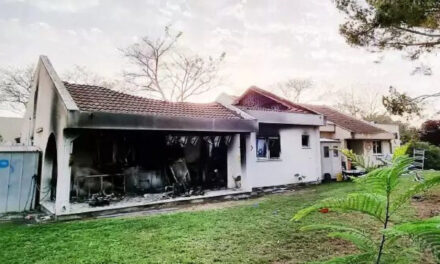Working canines and their handlers from multiple U.S. Department of Homeland Security agencies participate in a DHS Working Canine Showcase on the Hill, at the Rayburn House Building in Washington, D.C., on July 10, 2024. Photo courtesy of Mikaela McGee/Department of Homeland Security.
By ROLENE MARKS
JNS
April is a bittersweet month in Israel’s calendar. It is the month when the national holidays of Yom Hashoah, Yom Hazikaron and Yom Ha’atzmaut are marked in quick succession. It is a time of remembrance and celebration, but also a time that can be sensitive and triggering for members of Israel’s security forces.
Many communities made the decision this year not to have the traditional fireworks to celebrate Yom Ha’atzmaut, Israel’s Independence Day, out of sensitivity to soldiers suffering from post-traumatic stress disorder (PTSD).
PTSD, Suicides
Defense Ministry Deputy Director-General Limor Luria, who heads the ministry’s rehabilitation department, said that soldiers struggling with PTSD experience holidays and memorial days as hard, even more so during wartime. The department estimated that it would be treating approximately 100,000 wounded personnel by 2030, half of whom are expected to have suffered from PTSD.
The number of suspected suicides among Israeli soldiers rose sharply since the Hamas-led assault on Oct. 7, 2023, according to the data published by the Israel Defense Forces. Since the start of the war, some 28 soldiers have died by suicide. In 2023, before the Hamas attack, 10 suicides were recorded.
Since the Oct. 7, Luria notes that the Rehabilitation Department has absorbed some 16,500 wounded soldiers, nearly half of whom were treated for PTSD.
PTSD is defined by the Mayo Clinic as “a mental-health condition that is caused by an extremely stressful or terrifying event, either being part of it or witnessing it.” It is often characterized by recurring nightmares, frequent panic attacks, depression and other trauma symptoms. Often, those with PTSD fear sleep because persistent nightmares torment them.
Treatments
The wounds are not physical but internal, and for many years, PTSD has been misunderstood and often stigmatized. Treatment for veterans suffering from PTSD has not been adequate and has been neglected.
In April 2021, IDF veteran Itzik Saidyan set himself on fire outside the Petah Tikva offices of the Rehabilitation Department for disabled soldiers, after years of struggling to receive the care he had sought for PTSD.
Canine Companions
Following Oct. 7 and the rising number of soldiers experiencing PTSD, the Ministry of Defense has amped up efforts to treat this with a variety of different therapies, including special dog companions.
Animals play a vital role in helping PTSD sufferers process and cope with the emotions and challenges they face. Canine companions are excellent at providing a special kind of therapy. Therapy dogs help their soldier get active and leave the house because they need exercise. They help rebuild trust and give unconditional love. Dogs also help soldiers make the sometimes-difficult transition to civilian life and help their humans feel protected.
Tal Morag, a board member of No Soldier Left Behind—a nonprofit organization that offers canine therapy—told JNS that there is a clear distinction between therapy and service dogs.
“Soldiers live with the shock of battle that can come at any time,” she said. “There are certain triggers, like loud noise or the smell of blood, that can come at any time. It can take years to understand what is happening to them. We don’t question them, we give them the chance to tell their stories, and therapists assist them.”
“Not Alone”
She said the organization helps combat soldiers as well as police, paramedics and other security forces. “The dogs are trained not to be a service dog but just to be the soldier’s dog, and you can see the effect it has on him. The dog learns his owner, is able to smell that a panic attack is about to happen and can calm him down.”
Liran Dimri is the dog program coordinator at Belev Echad, a nonprofit that is dedicated to restoring wounded IDF soldiers and offers a program called Dogs 4 Soldiers. In an interview with JNS, Dimri explained how man’s best friend can also be his best therapist and how therapy dogs can help alleviate the trauma of soldiers who have fought in the current war.
“People who suffer from posttraumatic stress disorder usually prefer to be alone, locked up at home, and this is what causes them depression,” he said. “Dogs help them by getting them out of the house at least three times a day. In addition, when they are alone at home, the dog is always with them and seeks the person’s attention and treats them, so they don’t feel alone.”
Dimri, who understands firsthand the impact that PTSD has on families of soldiers, urges relatives to be involved in the training process. “I myself suffer from post-traumatic stress disorder. It mainly affects my sleep. I also got a dog three years ago, and it helped me a lot when I was depressed. So I can advise them on what to do and how it helped me. I also talk to their family members and explain to them about post-traumatic stress disorder and how they should deal with their children or partners, and that way it helps them deal with them better.”
Dimri concluded, “I encourage their family to come to dog training with them and to go through this process together, so that the soldiers understand that they are not alone in this process. Their family is with them, and so am I. In addition, it gives them quality time together at least once a week when we meet for training and eat together at the end of the evening.”










